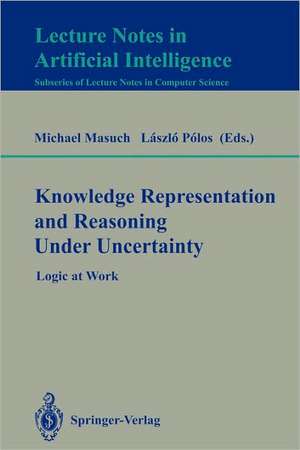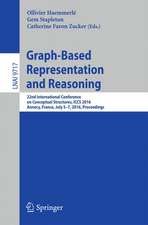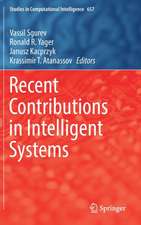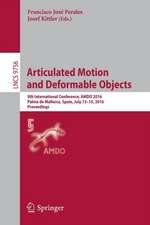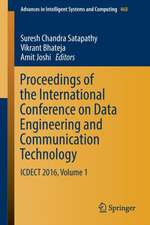Knowledge Representation and Reasoning Under Uncertainty: Logic at Work: Lecture Notes in Computer Science, cartea 808
Editat de Michael Masuch, Laszlo Polosen Limba Engleză Paperback – 28 iun 1994
Nowadays, logic is not any longer mainly associated to mathematical and philosophical problems. The term applied logic has a far wider meaning, as numerous applications of logical methods, particularly in computer science, artificial intelligence, or formal linguistics, testify. As demonstrated also in this volume, a variety of non-standard logics gained increased importance for knowledge representation and reasoning under uncertainty.
Din seria Lecture Notes in Computer Science
- 20%
 Preț: 1061.55 lei
Preț: 1061.55 lei - 20%
 Preț: 341.95 lei
Preț: 341.95 lei - 20%
 Preț: 369.12 lei
Preț: 369.12 lei - 20%
 Preț: 645.28 lei
Preț: 645.28 lei - 20%
 Preț: 591.51 lei
Preț: 591.51 lei - 15%
 Preț: 580.46 lei
Preț: 580.46 lei -
 Preț: 410.88 lei
Preț: 410.88 lei - 20%
 Preț: 504.57 lei
Preț: 504.57 lei -
 Preț: 381.21 lei
Preț: 381.21 lei - 20%
 Preț: 340.32 lei
Preț: 340.32 lei - 20%
 Preț: 1414.79 lei
Preț: 1414.79 lei - 20%
 Preț: 538.29 lei
Preț: 538.29 lei - 20%
 Preț: 583.40 lei
Preț: 583.40 lei - 20%
 Preț: 1075.26 lei
Preț: 1075.26 lei - 20%
 Preț: 238.01 lei
Preț: 238.01 lei - 17%
 Preț: 360.19 lei
Preț: 360.19 lei - 20%
 Preț: 438.69 lei
Preț: 438.69 lei - 20%
 Preț: 1183.14 lei
Preț: 1183.14 lei - 20%
 Preț: 596.46 lei
Preț: 596.46 lei - 15%
 Preț: 438.59 lei
Preț: 438.59 lei - 20%
 Preț: 655.02 lei
Preț: 655.02 lei - 20%
 Preț: 649.49 lei
Preț: 649.49 lei - 20%
 Preț: 309.90 lei
Preț: 309.90 lei - 20%
 Preț: 337.00 lei
Preț: 337.00 lei -
 Preț: 449.57 lei
Preț: 449.57 lei - 20%
 Preț: 310.26 lei
Preț: 310.26 lei - 20%
 Preț: 1024.44 lei
Preț: 1024.44 lei - 20%
 Preț: 579.30 lei
Preț: 579.30 lei - 20%
 Preț: 763.23 lei
Preț: 763.23 lei - 20%
 Preț: 453.32 lei
Preț: 453.32 lei - 20%
 Preț: 575.48 lei
Preț: 575.48 lei - 20%
 Preț: 585.88 lei
Preț: 585.88 lei - 20%
 Preț: 326.98 lei
Preț: 326.98 lei - 20%
 Preț: 825.93 lei
Preț: 825.93 lei - 17%
 Preț: 427.22 lei
Preț: 427.22 lei - 20%
 Preț: 763.23 lei
Preț: 763.23 lei - 20%
 Preț: 350.21 lei
Preț: 350.21 lei - 20%
 Preț: 307.71 lei
Preț: 307.71 lei - 20%
 Preț: 580.93 lei
Preț: 580.93 lei - 20%
 Preț: 340.32 lei
Preț: 340.32 lei - 20%
 Preț: 343.62 lei
Preț: 343.62 lei - 20%
 Preț: 583.40 lei
Preț: 583.40 lei - 20%
 Preț: 583.40 lei
Preț: 583.40 lei -
 Preț: 389.48 lei
Preț: 389.48 lei - 20%
 Preț: 353.50 lei
Preț: 353.50 lei - 20%
 Preț: 607.39 lei
Preț: 607.39 lei
Preț: 330.24 lei
Preț vechi: 412.80 lei
-20% Nou
Puncte Express: 495
Preț estimativ în valută:
63.21€ • 65.74$ • 52.97£
63.21€ • 65.74$ • 52.97£
Carte tipărită la comandă
Livrare economică 13-27 martie
Preluare comenzi: 021 569.72.76
Specificații
ISBN-13: 9783540580959
ISBN-10: 3540580956
Pagini: 252
Ilustrații: X, 242 p.
Dimensiuni: 155 x 235 x 13 mm
Greutate: 0.36 kg
Ediția:1994
Editura: Springer Berlin, Heidelberg
Colecția Springer
Seriile Lecture Notes in Computer Science, Lecture Notes in Artificial Intelligence
Locul publicării:Berlin, Heidelberg, Germany
ISBN-10: 3540580956
Pagini: 252
Ilustrații: X, 242 p.
Dimensiuni: 155 x 235 x 13 mm
Greutate: 0.36 kg
Ediția:1994
Editura: Springer Berlin, Heidelberg
Colecția Springer
Seriile Lecture Notes in Computer Science, Lecture Notes in Artificial Intelligence
Locul publicării:Berlin, Heidelberg, Germany
Public țintă
ResearchCuprins
The role of expectations in reasoning.- On logics of approximate reasoning.- Gentzen sequent calculus for possibilistic reasoning.- A model of inductive reasoning.- Automated reasoning with uncertainties.- An axiomatic approach to systems of prior distributions in inexact reasoning.- Contradiction removal semantics with explicit negation.- Logic programming for non-monotonic reasoning.- Agent oriented programming: An overview of the framework and summary of recent research.- An application of temporal logic for representation and reasoning about design.- Knowledge theoretic properties of topological spaces.- Rough logic for multi-agent systems.- A logical approach to multi-sources reasoning.- Situation theory and social structure.
